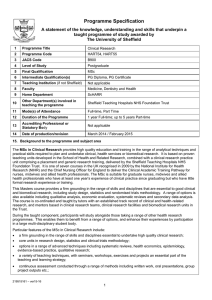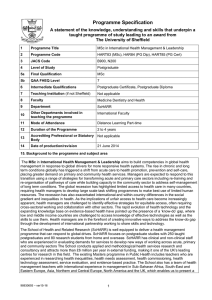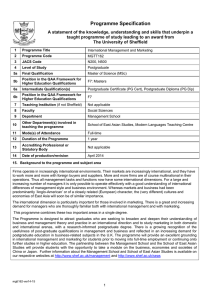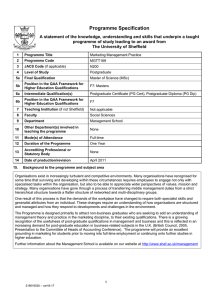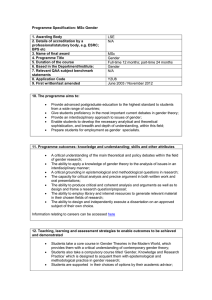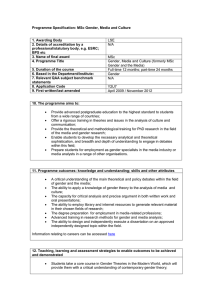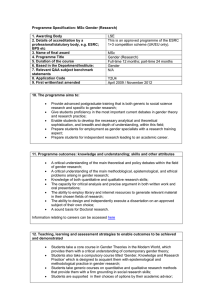Programme Specification
advertisement
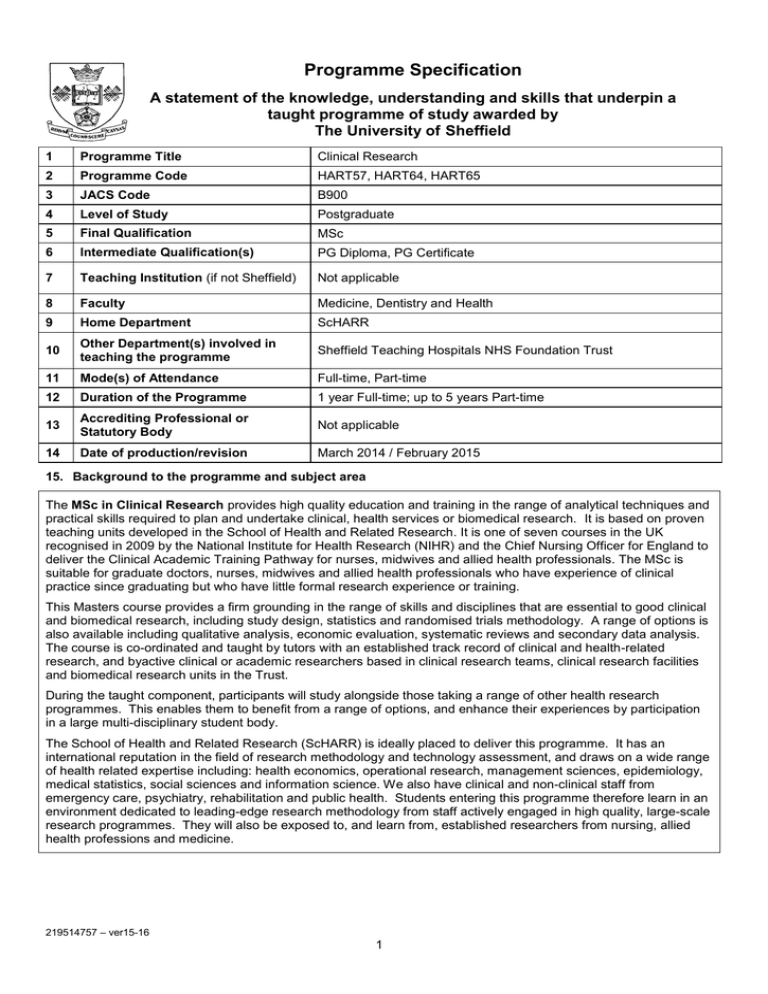
Programme Specification A statement of the knowledge, understanding and skills that underpin a taught programme of study awarded by The University of Sheffield 1 Programme Title Clinical Research 2 Programme Code HART57, HART64, HART65 3 JACS Code B900 4 Level of Study Postgraduate 5 Final Qualification MSc 6 Intermediate Qualification(s) PG Diploma, PG Certificate 7 Teaching Institution (if not Sheffield) Not applicable 8 Faculty Medicine, Dentistry and Health 9 Home Department ScHARR 10 Other Department(s) involved in teaching the programme Sheffield Teaching Hospitals NHS Foundation Trust 11 Mode(s) of Attendance Full-time, Part-time 12 Duration of the Programme 1 year Full-time; up to 5 years Part-time 13 Accrediting Professional or Statutory Body Not applicable 14 Date of production/revision March 2014 / February 2015 15. Background to the programme and subject area The MSc in Clinical Research provides high quality education and training in the range of analytical techniques and practical skills required to plan and undertake clinical, health services or biomedical research. It is based on proven teaching units developed in the School of Health and Related Research. It is one of seven courses in the UK recognised in 2009 by the National Institute for Health Research (NIHR) and the Chief Nursing Officer for England to deliver the Clinical Academic Training Pathway for nurses, midwives and allied health professionals. The MSc is suitable for graduate doctors, nurses, midwives and allied health professionals who have experience of clinical practice since graduating but who have little formal research experience or training. This Masters course provides a firm grounding in the range of skills and disciplines that are essential to good clinical and biomedical research, including study design, statistics and randomised trials methodology. A range of options is also available including qualitative analysis, economic evaluation, systematic reviews and secondary data analysis. The course is co-ordinated and taught by tutors with an established track record of clinical and health-related research, and byactive clinical or academic researchers based in clinical research teams, clinical research facilities and biomedical research units in the Trust. During the taught component, participants will study alongside those taking a range of other health research programmes. This enables them to benefit from a range of options, and enhance their experiences by participation in a large multi-disciplinary student body. The School of Health and Related Research (ScHARR) is ideally placed to deliver this programme. It has an international reputation in the field of research methodology and technology assessment, and draws on a wide range of health related expertise including: health economics, operational research, management sciences, epidemiology, medical statistics, social sciences and information science. We also have clinical and non-clinical staff from emergency care, psychiatry, rehabilitation and public health. Students entering this programme therefore learn in an environment dedicated to leading-edge research methodology from staff actively engaged in high quality, large-scale research programmes. They will also be exposed to, and learn from, established researchers from nursing, allied health professions and medicine. 219514757 – ver15-16 1 16. Programme aims The MSc in Clinical Research aims to provide students with in depth understanding of the process and techniques of clinical research, and provide the skills to undertake high quality independent research in a clinical setting. Specifically it aims to: equip students with the knowledge and skills required to initiate and complete high quality, methodologically sound and ethical clinical research; enable students to review and critically appraise the methods and results of existing research, and understand the implications for clinical practice. 17. Programme learning outcomes Knowledge and understanding: K1 Critical understanding of the principles of research design and the range of methods available for clinical research. K2 Applied understanding of statistics and processes of quantitative data analysis. K3 Applied understanding of the principles and techniques for the conduct of clinical trials. K4 Detailed understanding of advanced research methods and approaches including qualitative methods, epidemiology, secondary analysis and systematic reviews and evidence-based practice. K5 Understanding of the practical constraints and challenges of undertaking research in a clinical setting. K6 Critical understanding of project management, ethics and governance of research and the practicalities of completing a research project and writing an extended dissertation report. Students achieving the award of MSc will have developed well-grounded knowledge and understanding defined by outcomes K1 – K6 Students achieving the award of PG Diploma will have developed well-grounded knowledge and understanding defined by K1 – K5. Students achieving the award of PG Certificate will have developed well-grounded knowledge and understanding defined by K1 – K4. Skills and other attributes: S1 Evaluate clinical research critically. S2 Apply a range of quantitative and qualitative research methodologies appropriately in clinical settings. S3 Plan, execute and present an analysis of a dataset using a statistical software package. S4 Design a randomised clinical trial. S5 Apply concepts in advanced research methods (dependent on options chosen). S6 Apply generic research skills including project management, ethics and governance procedures, good clinical practice and public involvement in research. S7 Work productively in a clinical research setting. Students achieving the award of MSc will have developed to a high degree the skills and attributes defined by S1 – S7. Students achieving the award of PG Diploma will have developed to a high degree the skills and attributes defined by S1 – S6. Students achieving the award of PG Certificate will have developed to a high degree the skills and attributes defined by S1 – S4. 219514757 – ver15-16 2 18. Teaching, learning and assessment Development of the learning outcomes is promoted through the following teaching and learning methods: An Induction Day immediately before the autumn semester enables students to meet each other and staff who will be teaching them, to familiarise them with the resources available within ScHARR and to explore their expectations of the programme. In addition to programme-specific activities and meetings, students participate in a programme alongside other ScHARR postgraduate students, providing basic skills in information management, independent study and academic writing. Lectures provide students with formal teaching input in the core subject areas of clinical research, supported by presentations and discussion of research currently being undertaken in ScHARR, and presentations from external speakers with expertise in specific subject areas. (K1-6). Group work and seminars encourage the application of knowledge to clinical research problems, and sharing and discussion of the research issues which arise in their own contexts (K1-6; S1-5). Hands-on Practical sessions provide training and practice in the use of information technology based methods and resources including statistical software packages for data analysis and trials management (K2, 4; S3, 5). Independent study is a key element of participation in the programme and students are expected to take responsibility for their own learning in class, and for the learning of other members of the group. Formative assignments and guided reading allow students to deepen their understanding of the issues raised. Distance learning materials provide generic skills. The final component of the programme is the dissertation, which enables students to integrate their learning in an extended period of independent study (K1-6, S1-7). Opportunities to demonstrate achievement of the programme learning outcomes are provided through the following assessment methods: Formative assessment Regular formative assessments are conducted as part of unit teaching sessions or as homework. These include structured exercises which require individuals to apply specific techniques, for example quantitative analytic tests (K2, S2), structured exercises designed to test critical thinking skills on an individual and group basis (K1 -4; S1-6) and self-assessment questions in study packs (S6). These assessments are used to test abilities and understanding of core principles and skills during units and allow any areas of weakness or difficulty in individual students to be identified and resolved before they undertake the more formal course assessment work. Summative assessment Units are assessed by either unseen examination or (more usually) by written assignments. The format of assignments reflects the learning objectives of individual units, for example, a research proposal (K1, S5), statistical exercise (K2, S2) or design of a clinical trial (K3, S4). Practical aspects of the clinical research practice unit are assessed by means of a reflective portfolio and personal development plan. This will include exercises from the generic research training, and a competency evaluation of practical work undertaken during the research placements. In addition, an assignment assesses ability to integrate practical experience of research with the theory provided in the distance learning materials studied as part of this unit (K1-6, S1-7). The dissertation (MSc only) is an opportunity to undertake an original piece of research based on primary or secondary data analysis or a systematic review of a topic in clinical research, in order to integrate the learning and skills from the entire programme (K1-6, S1-7). 19. Reference points The learning outcomes have been developed to reflect the following points of reference: The research-informed orientation of the University of Sheffield and the School of Health and Related Research as set out in University and School research strategies. The guideline for provision of Masters level training for the Clinical Academic Training Pathway as set out by the National Institute for Health Research. Framework for Higher Education Qualifications (2008) http://www.qaa.ac.uk/Publications/InformationAndGuidance/Pages/The-framework-for-higher-educationqualifications-in-England-Wales-and-Northern-Ireland.aspx 219514757 – ver15-16 3 University Strategic Plan http://www.sheffield.ac.uk/strategicplan Learning and Teaching Strategy (2011-16) http://www.shef.ac.uk/lets/staff/lts 20. Programme structure and regulations The MSc in Clinical Research provides a structured programme, within which basic knowledge and skills are augmented progressively through study of core and advanced units, for both full-time and part-time participants. Three 15-credit core units are taught, providing the fundamental knowledge and skills in clinical research. A further three 15-credit advanced units are studied, chosen from a range of options. The practical aspects of clinical research unit, is a 30 credit unit that runs across both semesters in one academic year and includes training in generic research skills. that may be applied during the dissertation (for MSc students). Full-time students begin their dissertation at the start of the second semester, while part-time students begin this component early in the second year. A Diploma may be awarded on completion of all units apart from the dissertation, while a Certificate may be awarded on completion of four units. Detailed information about the structure of programmes, regulations concerning assessment and progression and descriptions of individual modules are published in the University Calendar available on-line at www.shef.ac.uk/calendar 21. Student development over the course of study The programme has been designed to enable developmental understanding of the research process, and progressive gain of the skills required to perform successfully as an independent clinical researcher. The core units (3 x 15 credits) impart the fundamentals of the research process, and introduce the main building blocks in clinical research: study design, statistics, and clinical trials methodology. The optional units (3 x 15 credits) build on these foundations, enabling students to focus on a specific area of interest. Options include secondary analysis, qualitative methods, economic evaluation, epidemiology, using secondary data and evidence-based practice.. There is also a free choice option where students may choose any 15 credit M level module to meet their self identified, specific clinical academic learning outcomes. The clinical research practice unit links practical experiences of research with generic skills training, and provides opportunities for students to identify a topic for their own research during the dissertation. The dissertation provides the final step towards gaining the knowledge and practical skills to become an independent researcher. Students will develop a professional development plan to support their future research career. 22. Criteria for admission to the programme The requirement for admission is a second-class Honours degree in a clinical subject or equivalent qualification. Detailed information regarding admission to the programme is available in the University’s online Prospectus at www.shef.ac.uk/prospective/prospectus.html 219514757 – ver15-16 4 23. Additional information ScHARR conducts applied and methodological health services research and consultancy and attracts more than £6 million per year in external funding, making it one of the UK’s leading centres for research in this field. It was confirmed as the most powerful outlet for health services research in the 2008 Research Assessment Exercise. The School focuses on postgraduate studies and offers a portfolio of programmes including Master of Public Health, Health Services Research, and Health Management and Leadership. The School also has more than 80 postgraduate research students from home and overseas, and is recognised by the ESRC for research training, with quota studentship allocation. This specification represents a concise statement about the main features of the programme and should be considered alongside other sources of information provided by the teaching department(s) and the University. In addition to programme specific information, further information about studying at The University of Sheffield can be accessed via our Student Services web site at www.shef.ac.uk/ssid. 219514757 – ver15-16 5
